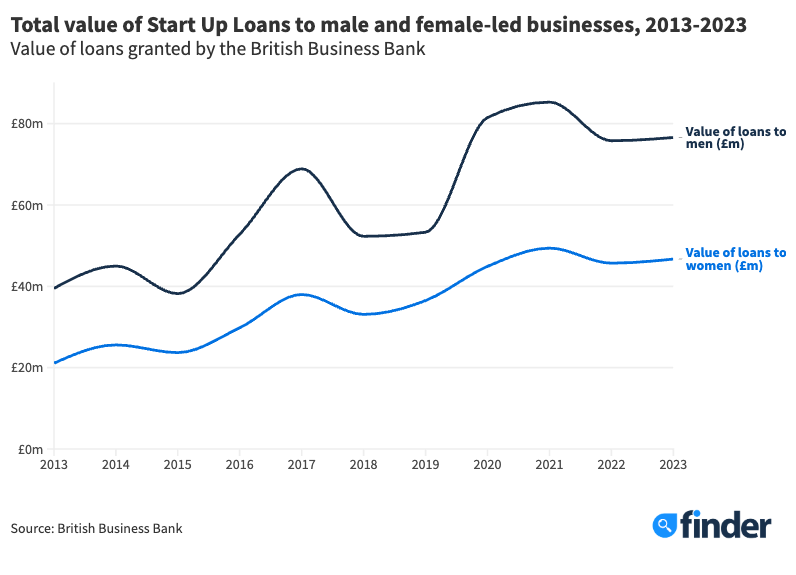Funding gap for women-led start-ups widening, says new report

The financing gap between men and women for government-backed Start Up Loans has widened by 78% since the Alison Rose Review was published in 2019 – an independent review of female entrepreneurship in the UK commissioned by the Treasury.

This is despite one of the key recommendations of the Rose Review being that funding to female entrepreneurs should increase. The report highlighted that up to £250bn of new value could be added to the UK economy if women started and scaled new businesses at the same rate as men.
Following the findings, the government announced an ambition to significantly increase the number of female entrepreneurs by 2030. However, analysis of data exclusively obtained from the British Business Bank found the value of Start Up Loans granted to female-led businesses in 2023 was £46.7m, while the value of loans to male-led firms was £76.6m, creating a gender disparity of £29.9m.
On paper, the value of loans granted to female entrepreneurs has increased since 2019, but it has not risen at the same rate as loans to men. The value of loans to male-led businesses increased by 44% in this period, rising from £53.3m to £76.6m, compared to an increase of just 28% for female-led businesses, rising from £36.5m to £46.7m.
As well as looking at total loan value, the analysis also reviewed the number of individual loans granted to men and women and found that only two in five Start Up Loans were granted to female-led businesses in 2023.
While the actual number of Start Up Loans granted to women has increased slightly, from 3,557 in 2019 to 3,850 in 2023, the percentage of loans granted to women has decreased from 43% in 2019 to 40% in 2023. This is despite the government’s target of boosting female entrepreneurship in the UK.
Olenka Kacperczyk, professor of strategy and entrepreneurship at the London Business School, said: “Investors and lenders systematically discount and overlook the potential of women founders to deliver returns. These biases persist even in carefully controlled experimental settings, as women founders receive less favourable evaluations and resource commitments than men when presenting the exact same start-up pitch and credentials.”
Over the same period, there has been a rise in women holding leadership positions at the UK’s largest companies. Some 42.6% of members on FTSE 100 boards were women in 2023, up from 32.4% in 2019.
This suggests that progress towards gender parity is being made among the big hitters in the UK, while funding for new businesses in the form of Start Up Loans is still lagging behind, despite the recommendations in the Rose Review.
However, British Business Bank has hit back at allegations of gender bias.
A British Business Bank spokesperson said: “Consistently over time, nationally around 40% of our Start Up Loans have gone to female founders – a significantly higher proportion than across the rest of the market for start-up financing. According to the latest available statistics (2022), 18% of smaller businesses with employees and 20% of smaller businesses without employees are female-led. By delivering 40% of our loans to women, we’re helping to address this imbalance. Our aim is to increase this still further to 50% over the coming years.
“This research does not give a full account of the positive impact of the Start Up Loans programme. The overall funding supported by the programme has greatly increased over the period stated and the proportion of funding going to female founders has remained at around 40%. Our funding for female founders increased from £36.5m in 2019 to £46.5m in 2023, the second highest year on record.”
Michelle Stevens, business loans expert at the personal finance comparison site finder.com, said: “Work is being done to improve representation at the highest level, as shown by the make-up of FTSE 100 boards, so why can’t the same be said for those wanting to launch or grow a small business in the UK?
“I’d like to see funding for female-led start-ups growing at the same rate as for male-led start-ups. SMEs are the backbone of the UK economy, making up 99.9% of private sector companies and contributing 53% of turnover. Therefore, real progress requires funding support for female founders early on in their entrepreneurship journey, so they can help shape the future business landscape.”









